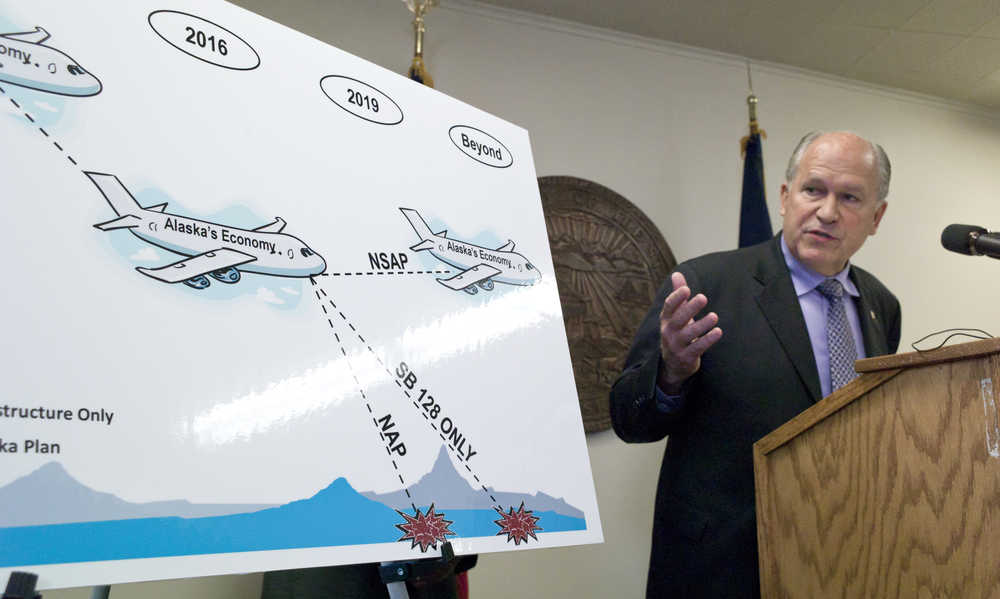Looking back, 2016 brought momentous change at the state level for Juneau — but it might turn out to be just the preface for the issues that 2017 will bring. Many of 2016’s biggest highlights were issues that went unresolved or only partially resolved, meaning that in the new year, you’ll see many of these same topics again.
This time around, we selected and ordered the 10 biggest state stories of the year based on their impact on Juneau and Southeast Alaska. These might not have been the biggest stories statewide, but here in the capital city, they resounded.
1. Budget trouble
The past year was one of missed opportunities for an Alaska Legislature that failed to substantively cut the state’s budget deficit. Lawmakers successfully reduced the state’s subsidy of oil and gas drilling in Cook Inlet, but they left alone a loophole that requires Alaska to pay millions to the big North Slope producers when oil prices are below $45 per barrel.
While legislators did cut several hundred million from state spending, the state’s annual deficit is still about $3 billion. The only new revenue measure? A few million dollars from increased hunting and fishing fees.
With so much of Juneau’s economy dependent upon state government spending, the failure to fill the deficit has plenty of capital-city residents worried — and the state’s savings accounts won’t last past 2018.
2. Election turnover
Alaskans might have been upset about the state’s budget, or they could’ve just been part of the anti-establishment surge nationwide, but in either case, this year’s state election will bring a big change in the Alaska Legislature.
Of the Legislature’s 60 members this year, 15 are new. In the Mendenhall Valley, the defeat of incumbent Cathy Muñoz by challenger Justin Parish was one of the biggest upsets in the entire state.
In part because of that swing, the Alaska House will be led by a coalition of Democrats, independents and moderate Republicans. That’s a significant change from the group of Republicans and rural Democrats who held the majority in 2015 and 2016.
There’s also Donald Trump to consider. With Republicans holding the presidency plus majorities in the U.S. House and U.S. Senate, there’s a chance for big shifts in federal policy pertaining to Alaska — everything from land ownership to offshore drilling and Tongass timber might be in play.
3. Permanent Fund Dividend cuts
After the Alaska Legislature failed to significantly address the state’s budget deficit, Gov. Walker unilaterally did by vetoing half the Permanent Fund Dividend. That saved the state almost $600 million, but it cost every Alaskan about $1,000 — effectively a tax on every man, woman and child.
The veto has had knock-on effects, too. According to the City and Borough of Juneau, local sales tax receipts are down, since Juneauites had less money to spend in fall 2016. That has an effect on city budgets as well as each Alaskan’s pocketbook.
4. The Road is dead
In mid-December, Gov. Walker announced he had decided not to build a road north out of Juneau. The end of the Juneau Access project means an end to more than a decade of work, but it’s not likely to end the idea of a road out of the capital city. After all, the idea of a road has been around since at least 1905.
5. Natural gas pipeline evaporates
In 2016, the state’s partners in AKLNG, the trans-Alaska natural gas pipeline, largely backed out of the effort. The pipeline is now in the hands of the state alone, but with natural gas prices slumped and the state facing a critical budget situation, the future of the pipeline doesn’t appear promising.
6. Criminal justice reform
The Legislature didn’t solve the state’s budget problems, but it did approve a comprehensive reform of Alaska’s criminal justice system. Senate Bill 91, helmed by Sen. John Coghill, R-North Pole, is designed to cut incarceration costs and reduce the number of convicted criminals who return to jail after their release.
Despite its noble goals, the reform program ran into opponents who said it was too soft on criminals. The impact of the bill will take years to become apparent, but whether it succeeds or fails, it’s no small change.
7. Ferry system struggles
This year, the Alaska Marine Highway System continued to struggle with budget cuts and an aging fleet. The ferry Taku stayed tied up in Ketchikan all year, and one of the state’s two fast ferries joined the Taku in layup. Mechanical breakdowns added to the trouble, and a negative survey report led the Marine Highway to restrict the operations of the Tustumena, one of only two ships that can serve Kodiak and the Aleutians.
8. Neverending Legislature
The Legislature needed a long time to avoid solving the state’s budget problems — after a 121-day regular session, the Legislature stayed in special session from May 23 to June 19, then again from July 11 to July 18. The extended stay in Juneau was so long that it conflicted with Celebration — whose attendees forced lawmakers out of their hotel rooms and rented homes.
9. Marijuana flourishes
While much of the state’s economy struggled in 2016, the situation was brightened by the addition of a new industry: cannabis. Alaska’s first marijuana growers and retailers opened their doors in 2016 and paid their first taxes into state coffers. The state expects to earn $5 million in taxes from the marijuana industry by summer 2017, and local governments are expected to earn millions more.
10. Climate change continues
This past year will go into the books as the warmest Alaska (and Juneau) have ever seen. That beats the old record — set in 2015. Southeast glaciers keep receding, and the weather is trending warmer.

